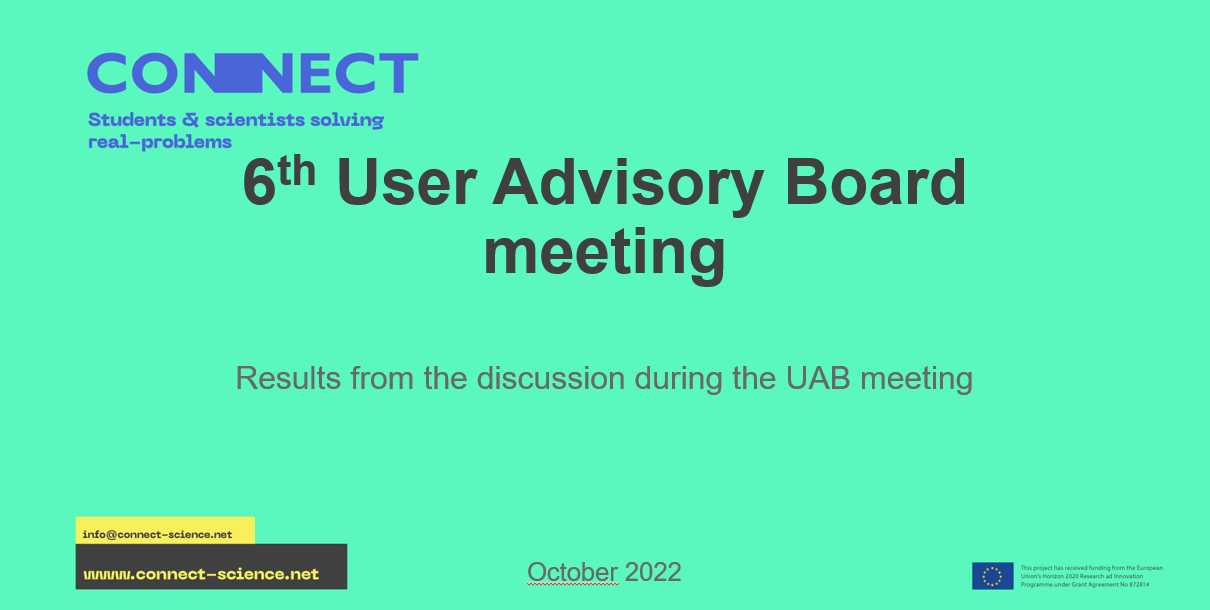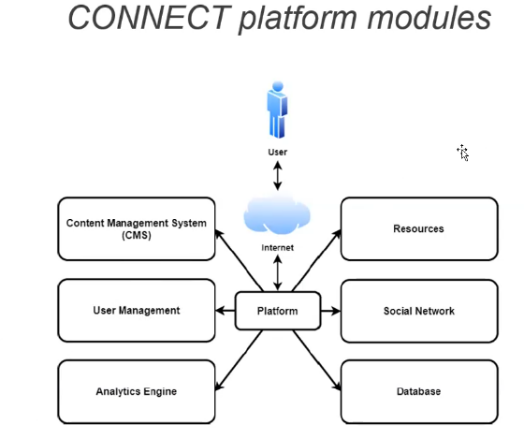News . Our Blog 6th User Advisory Board Meeting

How can CONNECT attract more policymakers and Scientists to enhance STE(A)M
The CONNECT User Advisory Board (UAB) met online in October 2022 to discuss how CONNECT can mobilize scientists and policymakers to enhance STEAM education. Scientists and policymakers are important in promoting open schooling and STEAM. Scientists play an important role in motivating and encouraging young people to pursue careers in science, and policymakers are key actors since they are setting the frame for schools and education. In this regard, policymakers should not only be understood as those operating on a national level but also on a local level, e.g. school heads.
The CONNECT platform
The user advisory board meeting began with EXUS presenting the CONNECT platform, and how it facilitates the mobilization of policymakers and scientists and supports their involvement. The platform is a multi-actor virtual environment that supports and consolidates the work done in CONNECT. It contains various tools, such as educational resources, a social network and a database of partners and projects. Consequently, the platform brings the community together and is a think tank for open schooling.
Take a look here:

The platform has experienced significant progress in mobilizing policymakers and scientists all over the EU and in Brazil. The platform has increased rapidly (311%) since its start and there are now 1291 users, 257 published posts, and 11757 page views. Currently, there are 1291 members of the platform, including 143 scientists and 137 school heads, and this number is increasing rapidly.
See the up-to-date status here:
Best practices
This presentation was followed by examples from different CONNECT partners of how they engaged policymakers and scientists
BRAZIL
The Open University UK
shared their experience of their partnership with the secretary of Maripora in Sao Paulo part of the National Union of Municipal Education Managers, UDIME, linked to the Ministry of Education of Brazil Government. The objective of UDIME is to promote social equality in education, with a focus on preschool and primary school. UDIME involves schools, universities, communities, and local organizations in investigating real-life problems.
The project developed by the secretary of Maripora focused on protecting the largest urban forest in the world located in Sao Paulo, based on the pedagogical model “care/know/do.” This is a project similar to CONNECT’s rewilding project. This project involved more than 10 schools, 115 teachers in CONNECT platform with 29 users active and more than 3000 students with 350 participants who completed CONNECT evaluation. UDIME was open to sharing its own innovations and to being inspired by CONNECT’s terminology on open schooling, science capital and the care/know/do approach to enrich and describe its practices. The project provided more than 100 teachers with professional development and new pedagogical practices as well as the opportunity to explore the pupils’ science capital.
Following this project, the UDIME leaders have joined the CONNECT platform. Thus, a lot of the resources connected to the project can be accessed on the platform, such as the interaction between scientists, policymakers, and students.
APC PUC-PR /UNEB
APC PUC-PR/UNEB used their existing network to mobilize scientists and policymakers in CONNECT Brazil, inviting scientists from their postgrad program, masters, doctoral students, and teachers from previous years. The same strategy is applied to involving policymakers, as APC/UNEB is reaching out to former students who are now in public positions.
GREECE
In Greece, RDE, a governmental organization, applies a context-based approach to mobilizing scientists and policymakers. RDE has planned to expand the number of scientists involved in the CONNECT project in the third year by expanding the project to all regions in Greece. The Ministry of Education has reached out to all schools to implement CONNECT, showing their support for the project.
As the project expands, it will engage more teachers who in turn will engage more scientists. This way, RDE aims to increase the number of scientists in the project to 75 from the current 33. This will, for instance, be achieved by engaging local scientists and scientists of different expertise. RDE will support the mobilization of the local policymakers by conducting webinars and inviting them to join the local UAB. RDE also plans to invite policymakers to the CONNECT student conference in May 2023.
Spain/Catalunya
IRSI implements CONNECT within an already existing network of Sentinella schools in Catalonia. The Sentinella network is established by the government of Catalonia and consequently provides the perfect frame to mobilize policymakers. Being an already established network many relations are institutionalized with monthly meetings to discuss progress with policymakers. Additionally, at the end of the year a congress is organized with the whole educational community, policymakers, and scientists to share results and experiences. Also, regarding involving scientists, the Sentinella network is working very well as there are weekly meetings with scientists concerning scientific action.
IRSI is working with a living lab concerned with health to create holistic solutions to complex problems such as COVID prevention or youths’ mental health. The aim is primarily to engage the schools to define a holistic solution and a coordinated approach that can take into account several aspects of the problem simultaneously. This year IRSI is designing materials and interventions for Catalonia in a co-design process with scientists and STEAM professionals. These materials and interventions are validated by students.
Challenges to mobilization:
In the second part of the UAB meeting the members discussed the challenges to mobilize policymakers and scientists in open schooling.
A major challenge was identified to be the lack of incentives for scientists to be involved in open schooling. Some scientists are motivated to participate as they are drawn by children’s direct communication and/or they have children and see the importance. Others need more formal incentives to get on board. A solution could be a formal recognition for public engagement and/or recognition for RRI engagement. Awards that can be useful for their CVs and careers. It was concluded that there is a need to discuss how to recognize the scientists.
A way forward is to recruit more scientists is, to get scientists already involved in CONNECT to recruit other scientists and nurture increased collaboration between scientists. It was also pointed out by one scientist in the UAB that scientist needs to understand that if scientists do not communicate their results with the general public including students, and teacher there is no sense in science.
Solutions
In the third part of the UAB meeting, IRSI lead an engaging and interactive workshop in Mural on the problems and opportunities faced in engaging policymakers and scientists in CONNECT and to promoting STEAM education and how to overcome these challenges. The workshop builds on a similar workshop held at the CONNECT consortium meeting in Greece (2022).
See the results here
The proposed solution was varied However some of the proposed solutions are not feasible within the CONNECT project, as they require a lot of resources. The workshop’s findings contributed to the list of recommendations for the third phase of the CONNECT project. These recommendations can be read in CONNECTs D6.3 report section 5.2.
- Create sustainable research and innovation networks within and among schools with teachers, students, families, heads of schools, administration and professionals for specific challenges (collective design and implementation of strategies)
- Link OS with real problem solving
- Collectively define shared visions for the resolution of local problems
- Design personalized and accessible (IT) solutions involving all participants, based on evidence obtained through OS
- Promote digital technologies to facilitate governance and collaboration and to integrate and analyse data from all schools and families
- Raise funds from science-based industries, public administrations and other stakeholders
- Promote organizational changes in schools to allocate working time for OS
- Promote communication activities related to challenges addressed through OS with specific actions with and for youth and policy makers
- Give recognition for teachers, students, scientists and inspiring practices
- Empower teachers, students and families for OS
- Ensure that the process considers equity, diversity and inclusion approaches for social justice to abolish learning, social and digital inequalities
- Ensure that the process follows a transdisciplinary approach
- Assure that the process promotes career awareness
- Assure that the process promotes innovation in STEAM education
Another solution proposed to expand CONNECT achievements is to engage with other stakeholders and network. If we only work to improve the education we are working with a certain speed but to accelerate and promote open schooling with a higher impact we need to cooperate with other ecosystems/networks who share the same problems with partnering with those.
During the third part of the UAB meeting, it was also discussed how to disseminate CONNECT achievements and make the open school approach sustainable after the project ends. A valuable contributor to this discussion was the Scientix representative. Scientix is an organization for science education in Europe. First, they shared their experiences on making projects viable, recognizing that being from a big organization is easier. Scientix makes project findings and materials available on its platform and produces guidelines, but thereafter stops trying to control what happens. It was also discussed if CONNECT could benefit from the Scientix network and cohost a webinar on open schooling in 2023 inviting other projects working with open schooling. Scientix regularly hosts network events, which are online workshops where different topics are addressed and possible solution discussed and summed up in a paper.
Read more here. Moreover, Scientix sent out a digest every second Tuesday where they can mention CONNECT. Scientix already has some open school materials on its platform.
This 6. UAB meeting provided a good discussion on how to mobilize scientists and policymakers and secure CONNECT’s sustainability after the project has ended.